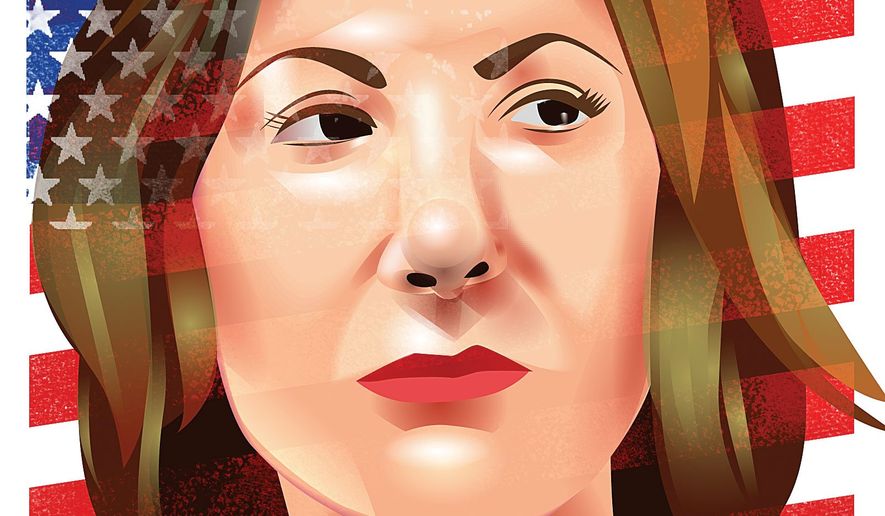OPINION:
When Carly Fiorina speaks, people lean in to listen. It’s not just because she speaks in measured, almost soft, tones. It’s because she projects an extraordinary calming presence, even when discussing the most dangerous threats and vexing problems facing America today.
Prior to the first Republican debate, Mrs. Fiorina had been struggling to break through in a very crowded field. After her masterful performance, however, she immediately vaulted into the top tier, with the attention and fundraising prowess that brings. She was confident, fluent on the issues and delivered solutions-based answers. She was particularly strong when she laid out the philosophical differences between conservatism and progressivism. More candidates should be doing that. All the time.
Mrs. Fiorina projects leadership, resilience and perseverance. And as the only woman running in the Republican race — willing to answer any question, any time — she is the anti-Hillary Clinton.
In a Donald Trump-free interview, I recently asked her about a range of issues, starting with the Islamic State (ISIS), al Qaeda, the Muslim Brotherhood and other fundamentalist Islamic groups: a religious-based enemy that cannot be deterred. How would she fight the broader war, both militarily and ideologically?
“I would discuss with our Arab allies how we can support them in their fight against ISIS,” she replies. “They know this is their fight but they must see leadership and resolve and support from us. We must also not be afraid to call ISIS what it is: Islamic extremism. We must know what we’re up against in order to defeat it.”
Upon becoming president, she will also likely inherit an Iran that will either possess nuclear weapons or be close to it. How would she manage that threat?
“On my first day in the Oval Office, I would make two phone calls,” she replies. “The first would be to my friend Bibi Netanyahu. I would reassure him that the United States will always stand with the state of Israel. My second call would be to the supreme leader of Iran. He may not take the call, but he would get the message. I would tell him: new deal. Unless and until Iran opens itself to full and unfettered inspections of all nuclear and military facilities, we are going to make it very hard for Iran to move money around the global financial system.”
Speaking of state-based threats, how she would roll back Vladimir Putin’s successes in rebuilding Mother Russia and prevent further Russian expansionism?
“I would stop talking to Putin — we’ve talked to him enough,” she says. “Instead, we should support our allies in the region who want to stand up to Putin. I would rebuild the Sixth Fleet. I would conduct military exercises in the Baltic States. I would rebuild our missile defense programs in Poland.”
Turning to the economy, I mentioned that this has been the worst recovery since World War II. During the Reagan recovery, growth rates were between 6 percent and 9 percent, and hundreds of thousands of jobs were created each month. Is that kind of recovery still possible, and if so, how?
“Two percent growth is not a new normal that we should get used to,” she says. “This kind of recovery is still possible if we get the real engine of our economy going and growing again. The engine of this growth is small business. In order to do that, we need to level the playing field, reduce complexities, roll back regulations, and radically simplify the tax code.”
When asked about Hillary Clinton, she knows that she can take her on in ways that the male candidates cannot or will not: “If Hillary Clinton were to face a female nominee, there are a whole set of things that she won’t be able to discuss. She won’t be able to talk about being the first woman president and she won’t be able to talk about a war on women without being challenged. Instead, she’ll have to run on her track record, candor and trustworthiness.
“In the end, Hillary Clinton’s scandals won’t make much of a difference unless we have a nominee who will ensure that they make a difference in the general election. We need a nominee who isn’t afraid to throw punches at [her].”
On a more personal note, when I asked what she learned about herself during her battle with breast cancer, she answered, “Although I would not wish cancer on anyone, I am genuinely grateful for the journey I went through. This experience allowed me to better understand the power of love, the comfort of friendship, the redemption of faith, and the kindness of strangers.”
Most Americans think that if running for president doesn’t kill you, the job will. Why do it?
“We are at a pivotal time,” she responded. “We need a leader who understands executive decision-making, which is a tough call in a tough time with high stakes. I understand how the economy works and how to get it growing again. I recognize how the world works and who’s in it. I’ve experienced how bureaucracies work and how to change them. I know how technology works and how to use it. I understand what it means to be held accountable for all of these things.”
Mrs. Fiorina is laser-focused on leveraging her stellar debate performance into lasting momentum by tuning out the noise, training her political fire on Mrs. Clinton and the Democrats, and keeping her eyes on the big prize. Slow and steady wins the race, and Mrs. Fiorina knows it.
• Monica Crowley is online opinion editor at The Washington Times.




Please read our comment policy before commenting.